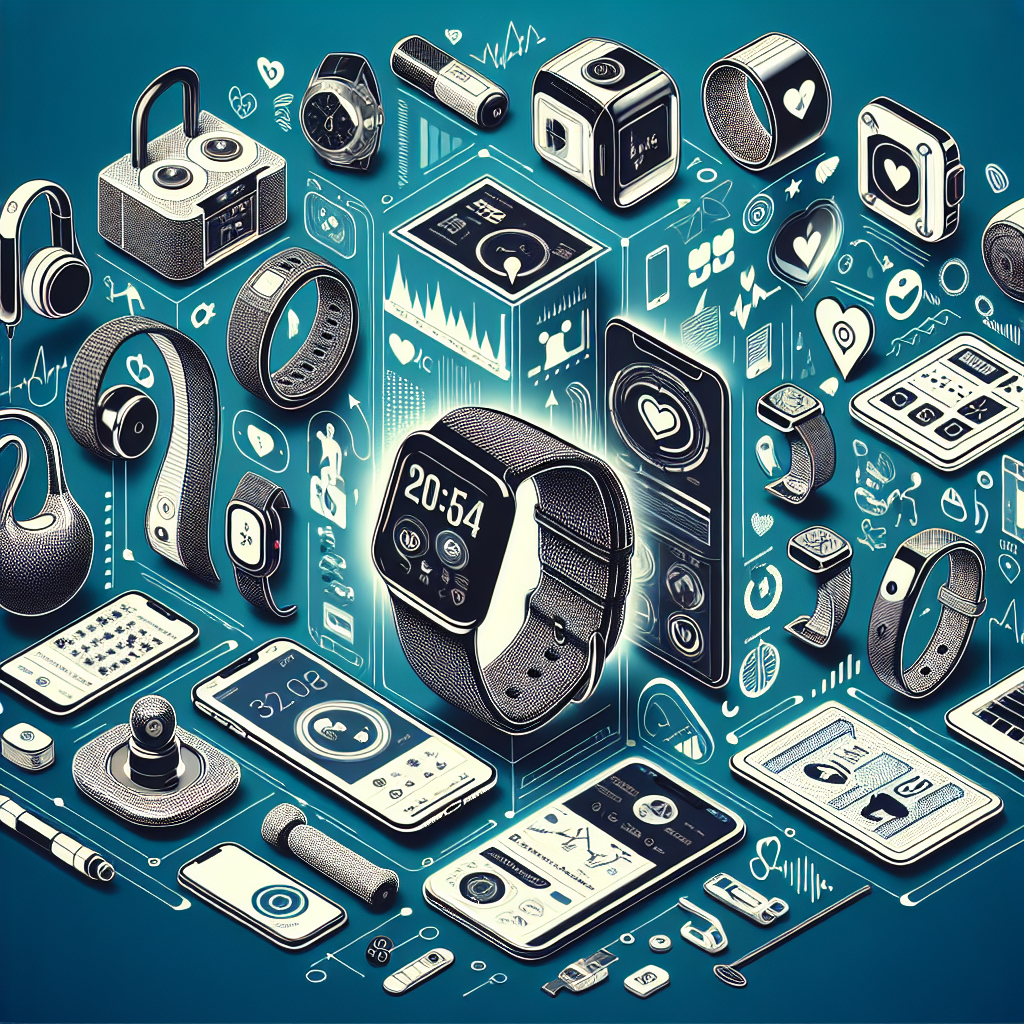Are you on a quest to find the perfect fitness gadget to enhance your workout routine? Look no further! In this comprehensive guide, we have curated a list of the best fitness gadgets available in the market. From activity trackers that monitor your daily steps and heart rate, to smart scales that provide detailed body composition analysis, we have got you covered. Whether you are a fitness enthusiast or a beginner looking to kickstart a healthier lifestyle, our guide will help you choose the ideal fitness gadget to elevate your fitness journey. Get ready to revolutionize your workout routine with these top-notch fitness gadgets!

Fitness Trackers
What is a fitness tracker?
A fitness tracker is a wearable device that is designed to monitor and track your physical activity. It typically comes in the form of a wristband or a small device that can be clipped onto your clothing. The primary function of a fitness tracker is to collect data about your movements, such as steps taken, calories burned, distance traveled, and even your sleep patterns.
How do fitness trackers work?
Fitness trackers use various sensors, such as accelerometers and optical heart rate monitors, to track your movements and collect data. The accelerometer measures your body’s movement and converts it into step counts, while the heart rate monitor uses light sensors to detect changes in blood flow and determine your heart rate.
Some fitness trackers also have built-in GPS that allows them to track your outdoor activities, such as running or cycling, more accurately. The data collected by the fitness tracker is then synced to a smartphone app or computer software, where you can view your activity history, set goals, and track your progress.
Benefits of using a fitness tracker
Using a fitness tracker can have numerous benefits for your health and fitness journey. Firstly, it provides you with a clear picture of your daily activity levels, allowing you to make informed decisions about your lifestyle. By monitoring your steps, distance, and calories burned, you can set realistic goals and track your progress over time.
Furthermore, fitness trackers can serve as a great motivator, as they provide immediate feedback on your performance. Seeing your steps increase or reaching your target heart rate zone can be incredibly satisfying and encourage you to stay active. Additionally, many fitness trackers come with reminders to move, which can help you develop healthier habits by promoting regular activity throughout the day.
Another advantage of fitness trackers is their ability to monitor your sleep patterns. By analyzing your movement and heart rate during the night, they can provide insights into the quality and duration of your sleep. This information can help you make adjustments to your routine and improve your overall sleep hygiene.
Popular fitness tracker brands
There are several well-known brands that offer a wide range of fitness trackers to suit different needs and preferences. Some of the most popular brands include Fitbit, Garmin, Apple, Samsung, and Huawei. Each brand has its own unique features and strengths, so it’s worthwhile to research and compare them before making a purchase.
Fitbit, for example, is renowned for its user-friendly interface, accurate data tracking, and extensive range of fitness features. Garmin, on the other hand, specializes in outdoor activities and offers advanced GPS tracking capabilities. Apple and Samsung focus on creating smartwatches with fitness tracking capabilities, combining the functionality of a fitness tracker with additional features like notifications and music streaming.
Top features to look for in a fitness tracker
When choosing a fitness tracker, there are several key features that you should consider to ensure it meets your specific needs. Firstly, accuracy is crucial. Look for a fitness tracker with reliable sensors and positive user reviews regarding its accuracy in tracking steps, distance, and heart rate.
Secondly, battery life is important, especially if you plan on using your tracker throughout the day and night. Some fitness trackers have longer battery life, while others may require frequent charging, so consider your usage patterns and choose accordingly.
Water resistance is another feature to keep in mind, particularly if you plan to wear your fitness tracker during water-based activities or if you sweat profusely during workouts. Many fitness trackers offer varying levels of water resistance, from splash-proof to swim-proof, so be sure to check the specifications.
Lastly, consider the compatibility of the fitness tracker with your smartphone or computer. Most fitness trackers sync their data to a dedicated app or software, so make sure it is compatible with your device’s operating system. Additionally, explore the features of the app or software, as it will be where you view and analyze your fitness data.
Smartwatches
Difference between fitness trackers and smartwatches
While fitness trackers focus primarily on health and fitness tracking, smartwatches offer a broader range of features beyond just activity monitoring. Smartwatches typically have a larger display and more advanced technology, allowing them to perform functions such as receiving calls and messages, playing music, and even downloading third-party apps.
In terms of fitness tracking capabilities, smartwatches often include the same sensors found in dedicated fitness trackers, such as accelerometers, heart rate monitors, and GPS. However, they may offer additional features like an altimeter to measure elevation, a gyroscope for more accurate movement detection, and integrated workout tracking for specific activities like swimming or yoga.
Key features of smartwatches for fitness
When choosing a smartwatch specifically for fitness purposes, there are a few key features to prioritize. Firstly, ensure that it has accurate and reliable heart rate monitoring capabilities, as this is essential for tracking your exercise intensity and calorie burn.
GPS functionality is also important, especially if you engage in outdoor activities like running or cycling. Having built-in GPS allows you to track your routes, pace, and distance without needing to bring your smartphone along.
Water resistance is another crucial factor to consider, especially if you swim or participate in water sports. Look for a smartwatch with a high level of water resistance, ideally with swim-tracking features to accurately record your laps and strokes.
Lastly, battery life is a consideration, particularly if you plan on using your smartwatch for extended periods without frequent charging. Some smartwatches have longer battery life in fitness tracking mode, while others may require daily charging. Assess your usage and charging preferences to find the optimal balance.
Best smartwatches for fitness enthusiasts
There are several excellent smartwatches available on the market that cater to fitness enthusiasts. Here are some top recommendations:
-
Apple Watch Series 6: Known for its seamless integration with Apple’s ecosystem, the Apple Watch Series 6 offers comprehensive fitness tracking features, including advanced heart rate monitoring, ECG functionality, and a range of workout options. It also boasts a bright and vibrant display with customizable watch faces.
-
Garmin Forerunner 945: Designed specifically for runners and triathletes, the Garmin Forerunner 945 offers advanced performance metrics, built-in GPS, and offline maps. It also has exceptional battery life and is compatible with various sports sensors and accessories.
-
Fitbit Versa 3: With its sleek design and comprehensive fitness tracking capabilities, the Fitbit Versa 3 is a popular choice for fitness enthusiasts. It features an always-on display, built-in GPS, 24/7 heart rate monitoring, and compatibility with Fitbit’s app and ecosystem.
-
Samsung Galaxy Watch Active2: The Samsung Galaxy Watch Active2 combines fitness tracking with smartwatch functionality. It offers accurate heart rate monitoring, GPS, and automatic workout tracking, as well as features like sleep tracking, stress monitoring, and smartphone notifications.
When choosing a smartwatch, consider your specific fitness goals, preferred features, and budget to find the best fit for you.

Heart Rate Monitors
Importance of monitoring heart rate during exercise
Monitoring your heart rate during exercise is crucial for maximizing the effectiveness of your workouts and ensuring your safety. Your heart rate provides valuable insights into your cardiovascular fitness and helps you gauge the intensity of your exercise.
By keeping an eye on your heart rate, you can ensure that you are working out in the appropriate heart rate zone for your goals. Different heart rate zones correspond to different intensities and target different fitness outcomes. For example, exercising within the aerobic zone (typically 70-80% of your maximum heart rate) can improve cardiovascular endurance, while exercising in the anaerobic zone (80-90% of your maximum heart rate) can enhance muscular strength and power.
Monitoring your heart rate also allows you to avoid overexertion and prevent potential health risks. Exercising at too high of an intensity for your fitness level can lead to exhaustion, dehydration, or even cardiac issues. On the other hand, exercising at a lower intensity may not provide enough stimulus to elicit the desired fitness adaptations. By tracking your heart rate, you can find the optimal balance for your workouts.
Different types of heart rate monitors
There are several types of heart rate monitors available, ranging from chest straps to wrist-based optical sensors. Each type has its own pros and cons, so it’s important to consider your preferences and requirements.
Chest strap monitors consist of a strap that you wear around your chest, which contains sensors that detect your heart rate. They are generally considered the most accurate type of heart rate monitor, as they directly measure electrical signals from your heart. However, some people find them uncomfortable or inconvenient to wear, especially during intense workouts.
Wrist-based optical sensors, commonly found in fitness trackers and smartwatches, use light sensors to detect changes in blood flow and estimate your heart rate. They are more convenient to wear compared to chest straps, but they may be less accurate, especially during high-intensity activities or if the device is not worn snugly on the wrist.
Additionally, there are also earlobe and finger pulse monitors, which utilize sensors placed on the earlobe or fingertip to measure your heart rate. While these types of monitors are less common, they can be useful in specific scenarios, such as during sports that involve gripping or when chest or wrist-based monitors are not feasible.
Accuracy of heart rate monitors
The accuracy of heart rate monitors can vary depending on the type of monitor and the individual. Chest strap monitors are generally considered the most accurate, as they directly measure electrical signals from the heart. However, wrist-based optical sensors have improved significantly in recent years and offer reasonable accuracy for most individuals.
It’s important to note that several factors can affect the accuracy of heart rate monitors. Factors such as the fit and position of the monitor, skin conditions, and the type of activity being performed can impact the results. For example, intense movement or excessive sweat may interfere with the optical sensors’ ability to accurately detect heart rate.
To ensure the best accuracy, it’s advisable to follow the manufacturer’s instructions for wearing and positioning the heart rate monitor. This usually involves placing the monitor snugly against the skin and ensuring it is in direct contact with your wrist or chest.
Top heart rate monitor options
Here are some top heart rate monitor options to consider:
-
Polar H10: The Polar H10 chest strap monitor is highly regarded for its accuracy and reliability. It provides real-time heart rate data, offers Bluetooth and ANT+ connectivity, and is compatible with various fitness apps and devices.
-
Garmin Forerunner 245: As a GPS running watch, the Garmin Forerunner 245 also includes reliable heart rate monitoring capabilities. It offers advanced running dynamics, built-in GPS, and compatibility with Garmin’s ecosystem.
-
Scosche Rhythm+: The Scosche Rhythm+ is a wrist-based optical heart rate monitor that provides accurate and reliable heart rate data. It offers a comfortable and adjustable strap and can be worn on the forearm or upper arm for convenience.
Remember to consider your specific needs, preferences, and budget when selecting a heart rate monitor.

